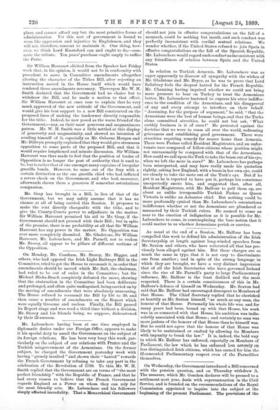The official correspondence in regard to Cyprus is most disheartening.
Judging by what English rule has done for Indian annexations, it was only reasonable for men to imagine that whoever lost by our taking the island out of the hands of Turkey, its inhabitants must be gainers. Unfortunately, such expectations have proved groundless. Though we have done our best to improve a poor country ruined by Ottoman imbecility and sloth, we have practically failed. The indebtedneass of the peasants since our occupa- tion has grown greater instead of less, the taxes have risen, and can only be collected by the exercise of constant pressure ; while the small owners are dying out, and the land is passing at a nominal price " into the bands of a few large proprietors.' " The former peasant-proprietors," says Sir Henry Buller's despatch, " will be reduced almost to a condition of serfdom, and most of them will probably seek an asylum on the main- land, where there are already many Cypriot families settled." In fact, depopulation, the strongest proof of unsuccessful rule, has followed our occupation. To remedy these evils, the Cypriot Deputies propose to get rid of the Turkish tribute of £50,000 a year by raising a loan guaranteed by England, and to estab- lish Land Banks and reduce the expenditure,—all reforms more easily proposed than accomplished. What is to be the solution of these difficulties it is hard to see. No doubt plagues of locusts and a series of bad seasons have to a certain extent caused the present poverty of the island; but their effect must not be exaggerated. In truth, Cyprus is a desperately poor
place, and cannot afford any but the most primitive forms of administration. Yet this sort of government is bound to seem like oppression and injustice to Englishmen, and they will not, therefore, consent to maintain it. One thing, how- ever, we think Lord Knutsford can and ought to do,—com- mute the tribute. Ten years' purchase ought amply to suffice the Porte.



































